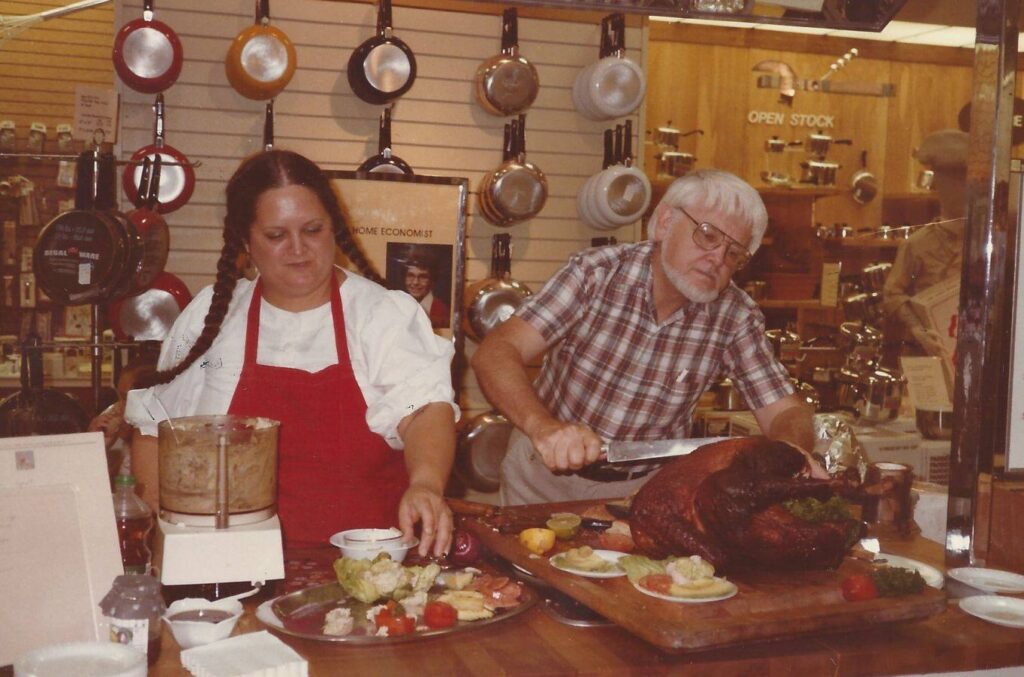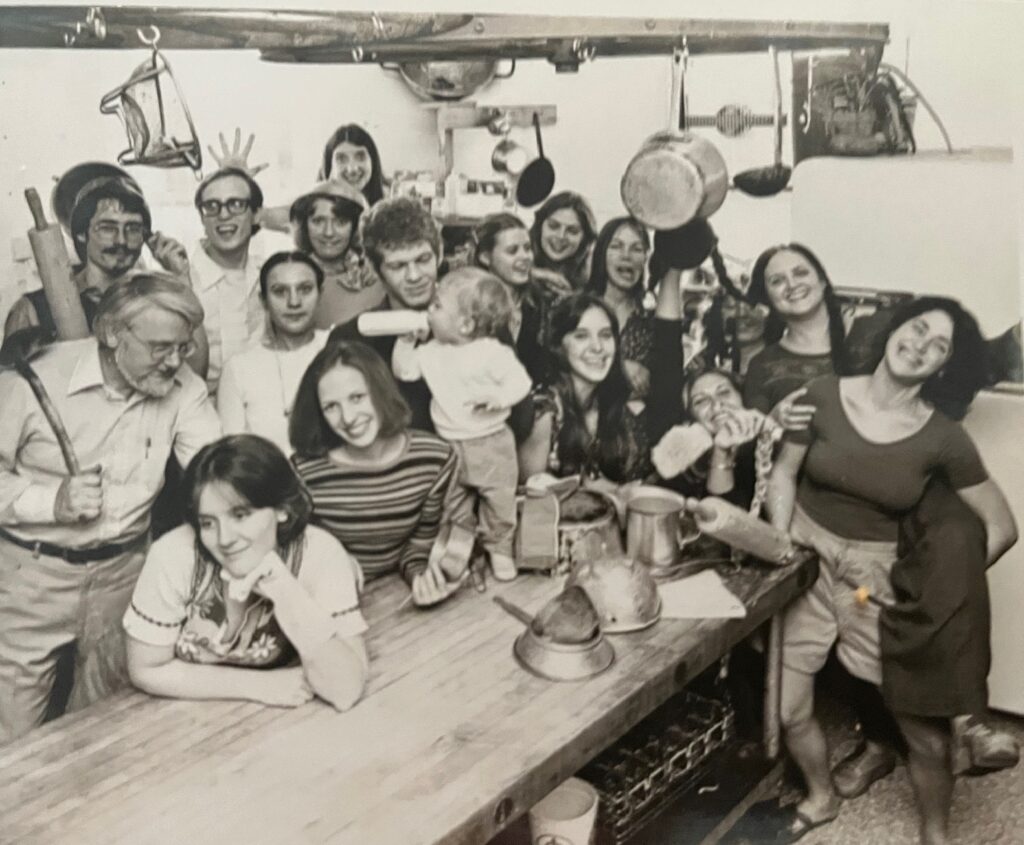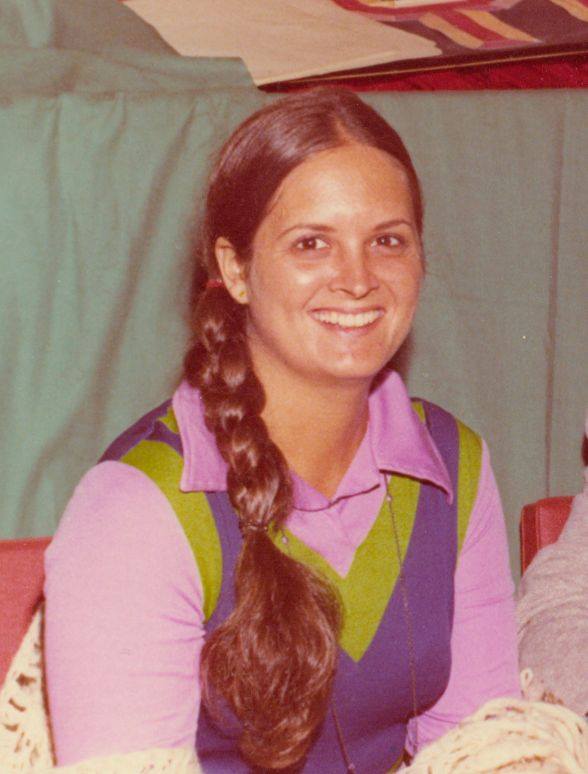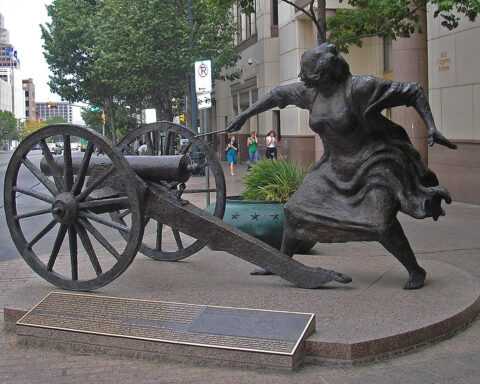Patricia Bauer-Slate
Patricia Bauer-Slate’s story is an integral part of Austin's modern culinary and cultural history. On a personal level, the restaurants she founded are a part of my own story. Many Saturday mornings back in the 1976-77 era, when Linda and I were first married, we’d drive over to the original location of Sweetish Hill, at 1410 Waller, and enjoy a European breakfast, complete with newspapers on wooden rollers to read. When she moved Sweetish Hill to Pecan Square on West 6th St. in 1978, we followed along and started having weekend breakfasts there. On Sundays, we would walk next door to Watson Books after eating, and pick up a New York Times that had been reserved for us from a stack that was over six feet high. Those memories come flooding back, and I’m so glad that I finally have had a chance to talk with this remarkable woman who made all of that come to be.
Like many fortuitous things in life, all of these good times might never have happened except for a twist of fate when the University of Texas denied her application to join the Plan II program after she transferred from the University of Pennsylvania. If she had been accepted into Plan II, she would likely have missed having Dr. Joe Slate as a personal tutor, and they wouldn’t have gotten married, which led to her traveling to Vienna with him on his Fulbright Fellowship year in 1972/73. While on that trip, she met master baker Tom Neuhaus and his wife. Together, Tom and Patricia hatched an idea for a breakthrough Austin restaurant, and they became business partners at Sweetish Hill. Sometimes, everything works out for the best. “What a fabulous time that Fulbright year was,” Patricia says.
After Joe and Patricia returned to town, Tom followed about six months later. Soon, they began the process of starting a European-style bakery and restaurant in Austin, which was a fine food desert at the time. They located a stately old home four blocks east of I-35 that had been the venue for Karen Kuykendall’s Theatre Unlimited, and bought it. One of the first things they had to do was dig trenches under the columns beneath the house and pour extra concrete so that the structure could withstand the installation of two heavy $300 Blodgett pizza ovens. In contrast, fifteen years later, at the West 6th location, they would purchase two ovens that cost a total of $80,000. They initially had around 25 employees—at the height of everything years later, they had 150. “We opened on a song and a tiny loan from our parents,” Patricia says.
On March 5, 1975, the day that they opened Sweetish Hill, she and Joe bought their house on Highland Avenue. Patricia came to the closing on the house wearing her dirndl from work. “I was baking and working the front of the restaurant! There was no chance to change.” To say the least, that was a landmark span of hours in her life.
The business was an immediate success. They sold out of their baked goods early on the first day. Soon, they were producing twice as much product as they thought they needed, and they felt quite proud of themselves. Patricia says that an employee's dad brought them down to earth with a wise saying, “Never mistake timing for intelligence.”
They were doing well at the first location, but soon, there were indications that a move might be necessary. For example, one of the issues they had to deal with was that the City of Austin was digging up Waller Street. It seemed like there was no timeline to complete the job, so Waller remained in disrepair for months, forcing their customers to search for parking blocks away. One memorable day, a regular customer returned to the restaurant with an ashen face, minutes after paying his bill. The partially excavated street had swallowed his car. It was East Austin, after all, and there was no hurry to finish the work.
Then there was a stroke of serendipity. In 1978, Mary McIntyre, who owned Pecan Square on West Sixth at Blanco, made a strong pitch for Patricia and Tom to move Sweetish Hill there. It didn’t take long for her to say yes. The move would put the bakery much closer to where most of her customers lived, and it would be a few blocks from her own home. Soon, they made a heroic transition from Waller Street to Pecan Square without missing a day of baking. People flocked there for pastries and other baked goods immediately, and lines of customers wrapped up the street. Patricia says that sometimes there were fights between people who thought others had cut in line.
It wasn’t long until they opened a restaurant behind the bakery, and things were booming. (The menu included a never-duplicated Beef Wellington that I still dream about, but that’s another story.) Then the 1980s arrived, and business started dropping off. Many other restaurants opened in West Austin, along with several large downtown hotels, and they also offered breakfasts and weekend brunches. The lines just weren’t there any longer.
In 1988, Jim Murphy, who was one of Tom and Patricia’s former cooking school students, entered the picture. He became Patricia’s partner in the business, and in 2008, she sold her share of the enterprise to him. He later sold the Sweetish Hill franchise to MML Hospitality. This organization has revised the restaurant’s name to Swedish Hill, operates a bakery just east of the original location, and has one in Westlake. It will also be opening a new, larger outlet at 415 Colorado, in the heart of downtown.
Soon after that, another opportunity for Patricia’s food preparation skills presented itself. A friend whose son is autistic and was attending All Saints School asked her to cook some gluten-free food for him and a few classmates. It was an instant hit. Patricia says her friend called and said, with tears in her voice, “My son came home and said, ‘Mommy! I got to eat what the other kids ate!’” With that encouragement, Patricia started preparing food for everyone in his class. She says that she had been running Sweetish Hill for 33 years and thought that this would be easier. “Another miscalculation on my part.”
The operation mushroomed, and she went down the school lunch path. In the first year, she had staffed up three people preparing food in each of seven schools. That meant ordering the food, training the staff, and ensuring everything was prepared properly. Patricia soon found out some of the downsides of this endeavor. Sometimes she had to take calls from angry parents who were steamed for reasons such as their child having been served rice instead of potatoes. And some kids were so clueless that they would throw their knives and forks into the trash cans.
The COVID year put an end to the school lunches, and that business had become stressful, to say the least. These days, Patricia still cooks for her granddaughter and several others. “I’m motivated by cooking for others. For me, life’s been a pantry!”
Some more tidbits from Patricia’s life.
--In her words: "My dad's father, Otto (we called him “Pop-Pop”), was a baker from Bavaria who came to this country in the 1880s, lived and married in Philadelphia twice (his first wife died), and started his own bakery there before WWI. He never spoke German at home. It was not a good time for that. I remember going to his bakery a few times, and he always invited me behind the counter so I could choose a pastry from the case. I did this myself at Sweetish Hill when I was out front, and there was a small child in line. But especially in the early years, I was baking as much as 12 hours a day and did not spend much time in the front.”
--When Patricia moved to Austin in 1969, she was renting an apartment from Ed Price, the former UT football coach. She gave him the first loaf of whole wheat bread that she had baked in Austin. After he savored a few bites, he told her that she could live there rent-free if she would bake him two loaves a week. A few months later, when Dr. Joe Slate proposed to her, she said that she had to weigh two attractive options against each other – living rent-free for bread or marrying him.
--On Christmas morning in 1980, the Sweetish Hill Deli on Walsh Street, south of their bakery at West 6th and Blanco, caught on fire. A man who worked in an adjoining office had left his space heater on when he locked up the previous night. Patricia sat there in the icy cold, wearing a coat thrown over her sleepwear, watching her business being incinerated. Meanwhile, a woman was walking around screaming, “My deli is burning down!” That woman had nothing to do with running the business – she was just a devoted customer.









